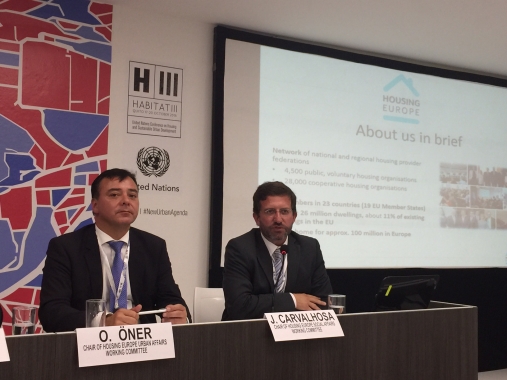Affordable and Adequate Housing: Policies in support of the SDGs
Housing Europe at Habitat III
Quito, Ecuador, 18 October 2016 | Published in Urban
Housing Europe has its own voice at Habitat III, the global conference shaping the New Urban Agenda for the next 20 years. The Chair of the Urban Affairs Committee, Özgür Öner as well as the Chair of the Social Affairs Committee, João Carvalhosa are representing the European Federation of Public, Cooperative and Social Housing in Quito. On the first day of the Habitat III Housing Europe co-organised a networking event dedicated on the way national and international housing policies can support the implementation of the UN Sustainable Development Goals (SDGs).
The 2008 global financial and economic crisis underscored the vital role that stable and transparent housing markets play in countries’ economies as a result of the crisis. In other countries, particularly those with economy in transition, housing situation was critical even before the crisis and got worse after. Some countries have experienced disturbing imbalances in their housing markets with foreclosures, homelessness, excess housing stock and a lack of affordable housing. Poor, disadvantaged and vulnerable populations lack affordable and adequate housing options. Those living in substandard and informal settlements often lack water, sanitation and other public services.
It is estimated that there are more than 100 million people in the UNECE region currently spending more than 40% of their income on housing. These problems are only set to worsen with a global projection of 2 billion people require social housing by 2030. If the Agenda 2030 Sustainable Development Goals for housing are to be realised then proper national policies and international guidance and assistance are required. The need for adjusting national policies for the provision of affordable adequate housing has been discussed in different fora by the governments, housing providers and other stakeholders.
Multiple high-level documents have been adopted and initiatives launched, including the UN-Habitat Global Housing Strategy and Housing at the Centre, the Geneva UN Charter on Sustainable Housing, a nonbinding document adopted by 56 countries of UNECE region, the Housing for All campaign led by Housing Europe. The networking event focused on building synergies between different organisations and networks and discussions on the topic of affordable adequate housing, national policies needed and international organizations’ role.
The contribution of Housing Europe
The Delegation of Housing Europe acknowledged that the Quito declaration contains a lot of positive elements referring to the importance of affordable housing.
However, something seems to be missing in the Declaration; The recognition of the necessity to set up long term housing institutions and structures.
All countries need professional and efficient housing providers which focus on social and affordable housing, a (regulatory) framework for the governance of such private, public or cooperative organisations, regulation and supervision of minimal housing quality (besides rent regulation), dedicated financial instruments/bodies, government support and supervision mechanisms. Providers of social, public or cooperative housing are dedicated social enterprises that have a key role-as the Delegation has showcased using various concrete examples from the ground- not only in housing policy but also in urban development, social inclusion and climate action, since they:
- Help mitigating increasing poverty and declining purchasing power;
- Help improve heath of their tenants by renovating their homes and adapting them to the old age;
- Help making better use of energy;
- Help integrating people in a culturally diversified society;
- Contribute to generate and share local/urban growth .
Despite their impact, public budget constraints and increasing social demand from new migrants/refugees and new poor put the affordable housing sector under pressure. The Housing4All campaign has been a great moment to gather inputs from various sectors/countries on how to cope with this challenging context and how to make social housing providers future proofed. We came to the conclusion that there is a need to promote dedicated responsible housing enterprises that will function around 3 principles:
FLEXIBILITY
INVESTMENT
COOPERATION
Housing policy (be it at the local, regional or national level) has to promote this approach for instance by:
- Allowing social housing to provide flexibility in rents, types of activities (energy/employment, financial inclusion, access to internet), types of housing (intergenerational)
- Supporting investment in various forms: Increase public expenditure (% of GDP) on affordable house building (both demand side and supply side) where needed, Maintain or expand tax and financial reductions for the building of affordable housing, Set up adequate instruments to make purchasing of land for affordable house building, encourage public and private banks to cooperate with social housing providers to finance the renovation of existing stock.
- Promoting cooperation between social housing providers and public authorities (land use policy, urban development), social services and care providers (housing with support for vunerable groups), other housing pracitioners (CLT), or private investors and banks (in order to ensure for instance the transformation of empty homes into social housing), or construction companies.

